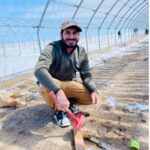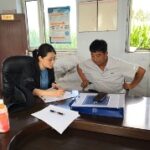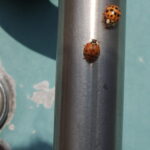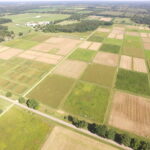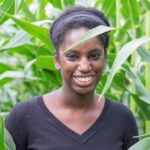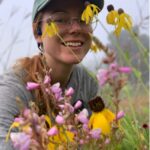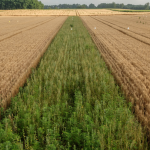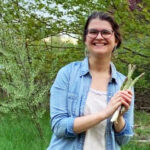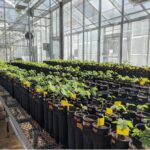Goutham Thotakuri is a graduate student in the Kravchenko lab at Michigan State University. His research is focused on the study of carbon transfer between various cover crop species and soil carbon sequestration. Recent changes to our climate dynamics have brought on alarming drought conditions in many parts of the world. Since we cannot control the climate, we need to prepare our agricultural systems for adversity. One way to do this is through understanding the soil's hydro-physical and biochemical processes. We can identify critical factors influencing drought resilience by
Exploring the effects of multiple crises on the global food trade system: Reflections from an LTER Fellow
Nan Jia is a graduate student at Michigan State University's Center for Systems Integration and Sustainability, Department of Fisheries and Wildlife, and Environmental Science and Policy Program. Her PhD research seeks to uncover how the multiple crises affect global food trade system dynamics. She worked closely with Jack (Jianguo) Liu and members of the lab to reveal the impact of different crises on different stages of trade such as production, handling, transportation, and consumption by using production data, trade data, supply chain data, and consumption data. The interactions between
Similar invasive insects coexist through slight differences in environmental responses
Novel analyses of a 31-year dataset on invading ladybeetles shows that small differences in habitat preference across years allow for two similar invading species to coexist while native species decline. Invasive species lead to novel interactions Invasive species are one of the main threats to biodiversity in an increasingly interconnected world. As humans move organisms around, either purposefully or incidentally, new combinations of species have the opportunity to interact with one another. These novel interactions have the potential to affect an invader’s persistence in the
KBS Long-Term Ecological Research program awarded $7.65 million NSF grant
The W.K. Kellogg Biological Station Long-Term Ecological Research program at Michigan State University recently received a renewal of its foundational grant from the National Science Foundation, reaffirming its future and status as one of the country’s premier research sites. Established in 1989, the KBS LTER is one of 28 NSF LTER sites nationally and is the only one dedicated to understanding the ecology of agricultural systems. With a focus on row crops, the 34-year-old program studies how agriculture can be environmentally friendly without harming yields. A renewal
Article featuring KBS research wins outstanding paper award
A paper that examines best practices for improving soil health over time has been recognized as outstanding by the American Society of Agronomy, or ASA. The paper, spearheaded by W.K. Kellogg Biological Station resident faculty and MSU assistant professor Christine Sprunger, detailed research that was conducted at the KBS Great Lakes Bioenergy Research Center site. Tvisha Martin and Meredith Mann also contributed to the paper, titled “Systems with greater perenniality and crop diversity enhance soil biological health,” which was originally published in 2020 in the journal Agricultural
The ABC’s – Agriculture, Beneficial Beetles and Conservation: Reflections from an LTER Fellow
Cynthia Fiser is a graduate student in Doug Landis's lab in the Michigan State University Department of Entomology. Her research looks at the impact of perennial prairie strips on the dispersal of ground beetles in row crop agriculture. Rolling hills of wheat, corn and soybean are a beautiful and nostalgic feature of the summer landscape in the Midwest. Here, agriculture is as much a part of the culture as the economy – anyone who attends a county fair would agree! However, the pressure placed on our agricultural landscapes to meet global demands for food, fuel and fiber takes a toll on
Little strips of prairie can go a long way
New research out of MSU shows that it is possible to manage farmland to address two challenges simultaneously – protecting biodiversity and maintaining ecosystem services. The key is to strategically place native perennial vegetation within agricultural systems, using the innovative practice of prairie strips. Today, 38% of the landscape in the Midwest is planted in row crop agriculture. “We need to make this land habitable for species for the ecosystem services the increased biodiversity can provide to the farms” said Lindsey Kemmerling, the first author of the MSU-led study
Transforming Michigan’s agricultural landscapes – Do prairie strips diversify insect communities in squash production?: Reflections from an LTER Fellow
Jen Zavalnitskaya is a graduate student in Zsofia Szendrei's lab in Michigan State University's Department of Entomology. Her research interests include plant-insect interactions, insect behavior, integrated pest management, and agroecology By the time I began my PhD, I knew I was passionate about promoting the biodiversity of agricultural landscapes. From my masters research in Zsofia Szendrei’s lab, I learned that the ways farmers manage their fields plays an important part in insect pest dynamics. However, the local landscape plays a large role as well. This creates a challenge,
Sarah Evans named to prestigious 2022 Earth Leadership Program cohort
Michigan State University microbial ecologist Sarah Evans is one of 22 leading sustainability scientists named to the 2022 North American cohort of the Earth Leadership Program (ELP). The ELP provides outstanding academic researchers with the skills, approaches, and theoretical frameworks for catalyzing change to address the world’s most pressing sustainability challenges, emphasizing new forms of individual and collective leadership. The program enables scientists to work collaboratively with diverse stakeholders and become agents of change within and beyond their
Studying small populations using big experiments: Reflections from an LTER Fellow
Isabela Borges is a graduate student in Sarah Fitzpatrick's lab in the Integrative Biology department at Michigan State University. Isabela won the J.S. Karling Graduate Student Research Award from the Botanical Society of America for her work on plant inbreeding on the legume-rhizobia mutualism. She is broadly interested in the feedbacks between community ecology and contemporary evolution, and their consequences for the persistence of small populations. Summer 2021 was a busy one. When I first proposed to conduct an experiment on two thousand plants, that just seemed like a nice large
